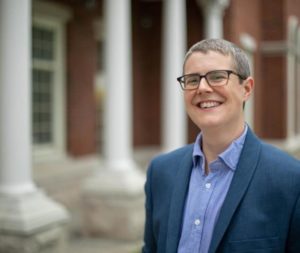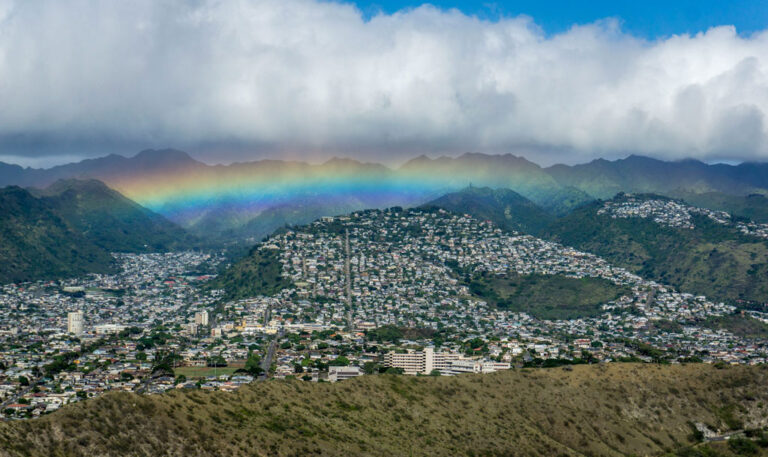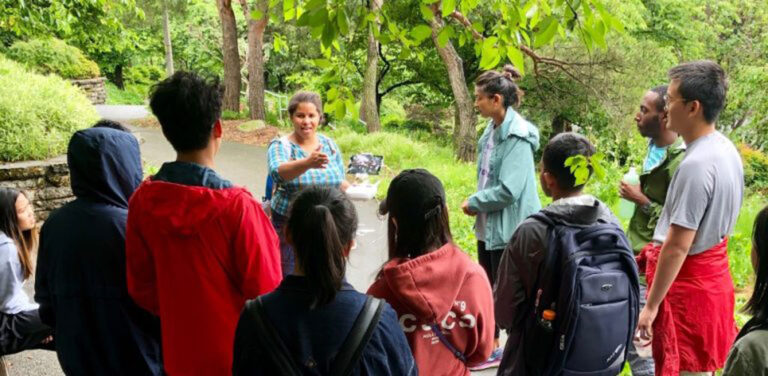2021 AAG Award Recipients Announced
The American Association of Geographers congratulates the individuals and entities named to receive an AAG Award. The awardees represent outstanding contributions to and accomplishments in the geographic field.
2021 AAG Presidential Achievement Award
The AAG Past President recognizes individuals who have made long-standing and distinguished contributions to the discipline of geography.
Michael DeVivo
After a career in the military and in the merchant marines, Mike DeVivo began a new life as a geographer. Since then, he has defined the value of the community college as a nurturing ground for new geography students by singlehandedly managing the geography program at Grand Rapids Community College. In his 30 years as an instructor, DeVivo has turned many students into geographers, several of whom have gone on to careers in the field.
Beyond teaching and advising, Mike has chronicled the field of geography. His book, Leadership in American Academic Geography: The Twentieth Century, looked at how geography chairs made a difference in the success of many prominent geography departments. His Conversation with a Geographer oral history series has enabled us to hear from these leaders directly. Mike has also reflected on the role of geographers in community colleges, many of whom stand alone in their institutions.
Prof. DeVivo maintains a steady involvement with the AAG and with higher education in general. He serves on the Healthy Departments Committee, he is active in the International Geographical Union Commissions on the History of Geography and on African Studies, and he has long demonstrated a passion for the field, typified in Mike’s motto: “Geography Lives!”
Jacqueline Housel
There are many opportunities found in a community college education, and Prof. Jacqueline (Jacquie) Housel has demonstrated these as a teacher, a mentor, and an advocate. Jacquie spent most of her career at Sinclair Community College, near Dayton, Ohio, where she has taught the value of a geographical perspective to students, many of whom have gone on to spread geography themselves.
Prof. Housel’s graduate work examined racialized patterns in urban areas. As a professor, she continued to publish on the role of race and refugees in journals such as Urban Studies, Urban Geography and Social and Cultural Geography. But her more recent works – in the Professional Geographer and other outlets – have focused on documenting the role and challenges inherent in community colleges. In these pieces, Jacquie shows just how pivotal two-year colleges are in shaping future geographers, and how community college professors and stand-alone geographers need to forge collaborations to maximize their impact on the curriculum.
Housel has consistently advocated for the inclusion of community college professors in the academy, and especially organizations such as the AAG. She was the first community college professor to head the East Lakes Division of the AAG, she led the stand-alone geographers and the community college affinity groups, has worked on establishing an AP GIS program, and serves on the Healthy Departments Committee. Jacquie also engages in the community by improving police-neighborhood relations and in educating her neighbors on local immigrants/refugees.
The Glenda Laws Award is administered by the American Association of Geographers and endorsed by members of the Institute of Australian Geographers, the Canadian Association of Geographers, and the Institute of British Geographers. The annual award and honorarium recognize outstanding contributions to geographic research on social issues. This award is named in memory of Glenda Laws—a geographer who brought energy and enthusiasm to her work on issues of social justice and social policy.
 Jen Jack Gieseking, University of Kentucky
Jen Jack Gieseking, University of Kentucky
Jen Jack Gieseking is an Assistant Professor at the University of Kentucky whose scholarship combines critical urban theory, GIS, and digital humanities to study queer, feminist, and trans geographies.
Having received his PhD in 2012, Dr. Gieseking has amassed an impressive research record including nearly two dozen peer-reviewed articles in high-impact outlets (many of them open- access) and a defining, cross-disciplinary reference text: A Queer New York: Geographies of Lesbians, Dykes, and Queers. Dr. Gieseking’s scholarship extends beyond publications to include leadership of ACME: International Journal of Critical Geographies, where his recommenders hail the inclusive culture he fosters among editorial staff and contributors. He actively mentors junior scholars and pioneers innovative teaching strategies drawn from critical roots. Furthermore, Dr. Gieseking’s LBGTQ Heritage Initiative Theme Study for the National Parks Service demonstrates the broader societal impacts of his scholarship.
Overall, the AAG Diversity & Inclusion Committee was excited to highlight the work of a queer, feminist, and trans geographer whose work fervently promotes the visibility of LBGTQ+ individuals, spaces, and place histories.
 Pavithra Vasudevan, University of Texas at Austin
Pavithra Vasudevan, University of Texas at Austin
Pavithra Vasudevan is an Assistant Professor in the Department of African and African Diaspora Studies at the University of Texas at Austin. Her feminist-inspired, participatory action research calls attention to environmental racism in Black communities in rural North Carolina. Despite only being in her second year on the tenure track, Dr. Vasudevan’s scholarly record includes peer-reviewed publications in Antipode, Area, and Environment and Planning C, several edited chapters, and a book manuscript in progress based on her field research: Toxic Alchemy: Black Life and Death in Industrial Capitalism.
Dr. Vasudevan engages creatively with community members, community organizations, and students, fusing ethnographic methods and performance arts (e.g., theater, music, and visual arts) with social science. Her recommenders include previous advisors, students, and colleagues who all testify to the extraordinary intellectual and emotional labor she invests in her activist research.
The AAG Diversity & Inclusion Committee felt strongly that Dr. Vasudevan’s research efforts not only exceeded the criteria of the Glenda Laws award, but that her inspirational pedagogy embodied the spirit of Glenda Laws’ own approaches to research, teaching, and advocacy.
2021 AAG Harold M. Rose Award for Anti-Racism Research and Practice
The Rose Award was created to honor Harold M. Rose, who was a pioneer in conducting research on the condition faced by African Americans. The award honors geographers who have a demonstrated record of this type of research and active contributions to society, and is awarded to individuals who have served to advance the discipline through their research, and who have also had an impact on anti-racist practice.
 John Frazier, Binghamton University
John Frazier, Binghamton University
Dr. John Frazier has made crucial contributions to anti-racist knowledge and praxis in geography in his nearly four-decade long career. His leadership as the founder of the Race, Ethnicity, and Place (REP) Conference is a hallmark of his contributions to challenge racism in the discipline and beyond. REP, geography’s most diverse conference now in its second decade, features research across the discipline and provides unmatched opportunities for networking and mentoring. Frazier has been instrumental in bringing this conference to a wide range of universities, including Historically Black Colleges and Universities, to expose geography to more diverse audiences and students. He has also served as a stalwart leader in the AAG Ethnic Geography Specialty Group. Frazier has dedicated his academic life to advancing the research and careers of geographers of color, having long lasting effects on the discipline through this conference and the professional network he has fostered.
Frazier’s research has addressed core issues in contemporary racial and ethnic geography and immigrant experiences. His publications have become key resources for researchers and instructors. Notably, he has co-edited three editions of Race, Ethnicity and Place in a Changing America, The African Diaspora in The U. S. and Canada at the Dawn of the 21st Century, and Multicultural Geographies of the United States, and co-authored Race and Place: Equity Issues in Urban America. Widely used in teaching, Frazier’s work has paved a pathway into the discipline for generations of geographers.
Overall, John Frazier has played a significant role in institutionalizing a critical study of race, equity, and inclusion within geography and making anti-racism part of the official, programmatic life of geographers—as found in its conferences, knowledge communities, publications, and pedagogy.
2021 AAG Harm de Blij Award for Excellence in Undergraduate Teaching
This annual award recognizes outstanding achievement in teaching undergraduate Geography including the use of innovative teaching methods. The recipients are instructors for whom undergraduate teaching is a primary responsibility. The award consists of $2,500 in prize money and an additional $500 in travel expenses to attend the AAG Annual Meeting, where the award will be conveyed. This award is generously funded by John Wiley & Sons in memory of their long-standing collaboration with the late Harm de Blij on his seminal Geography textbooks.
 Heather Bedi, Dickinson College
Heather Bedi, Dickinson College
Dr. Heather Bedi is Assistant Professor of Environmental Studies at Dickinson College where her teaching and research focus on peoples, places, and environments and the many connections between them. Students and faculty colleagues recognize her passion for teaching and her dynamic approach. She not only creates fresh ways for students to engage with course material in the classroom, but also provides opportunities for them to actively contribute to the local community using tools and knowledge obtained in the numerous courses she has developed.
Dr. Bedi’s teaching and community outreach are well-informed by her research into relationships among civil society, socio-environmental movements, and natural resource and landscape modifications. Moreover, she successfully obtains teaching related grants and student-faculty-community collaboration grants to advance the work.
Dr. Bedi is already making a strong mark on geography teaching and is poised to make an even more distinguished impact into the future.
2021 Wilbanks Prize for Transformational Research in Geography
The AAG Wilbanks Prize for Transformational Research in Geography will honor researchers from the public, private, or academic sectors who have made transformative contributions to the fields of Geography or GIScience. Provided there is sufficient availability of funds, the Wilbanks Prize will consist of a cash prize of $2,000 and include a memento with the name of the Prize and the recipient.
 Mei-Po Kwan, The Chinese University of Hong Kong
Mei-Po Kwan, The Chinese University of Hong Kong
Mei-Po Kwan has had transformational impacts on how transportation specialists and geographic information scientists think about accessibility and activity-travel patterns analysis; how feminist geographers understand quantification and GIS; how geographers and geographic information scientists integrate quantitative and qualitative methods and insights from different theoretical traditions; and how health geographers, public health researchers, and scholars in other disciplines think about environmental exposure and the significance of the neighborhood.
Employing feminist perspectives, Dr. Kwan has dramatically altered geo-visualization, the inclusion of qualitative data through geo-narratives, and she has broadened geographic information science beyond a narrow “objective” standard to more humanistic standards that include perceptions, emotions, and behavior as core concerns. She has also advanced conceptualization of concepts like uncertainty and bias by promoting more dynamic perspectives that examine spatial contexts as rooted in everyday behaviors and experiences rather than as containers fixed in space and time.
Both the significant substance and impact of Dr. Kwan’s work have transformed the discipline of geography and geographic information science and infused the broader community of researchers and practitioners with more robust geospatial understanding, thereby making her a highly deserving recipient of the Wilbanks Prize.
2021 AAG Stanley Brunn Award for Creativity in Geography
The AAG Stanley Brunn Award for Creativity in Geography is given annually to an individual geographer or team of geographers that has demonstrated originality, creativity and significant intellectual breakthroughs in geography. The award includes a prize of $1,000.
 Dawn Wright, Esri
Dawn Wright, Esri
Over her career, Dr. Dawn Wright has combined her expertise in spatial data science and oceanography to make creative and pioneering contributions to geography. She has authored or co-authored more than 180 articles and 12 books on oceanography and geographic information systems, including one of the first marine GIS books, Marine and Coastal Geographical Information Systems, co-edited with Darius Bartlett. Dr. Wright is no armchair scientist. Her saltwater fieldwork began with many expeditions on the scientific research ship, the JOIDES Resolution. Through those as well as subsequent expeditions which she joined and led, Dr. Wright has brought to the surface previously unknown ocean terrain in some of the most remote oceanic regions.
Dr. Wright began her academic career at Oregon State University and then joined Esri in 2011 as their Chief Scientist, the position she currently holds. She was a key leader of the joint Esri/US Geological Survey team that developed the first truly 3-Dimensional map of the waters within the world’s ocean, also known as the Ecological Marine Units.
During her distinguished career, she has received numerous awards and recognitions, including: 25 BadAxx Women Shaping Climate Action in 2021, the American Geographical Society George Davidson Medal, the Society of Extraordinary Women Science and Innovations Extraordinary Leaders Award, and the AAG Presidential Achievement Award. Dr. Wright has also been named a fellow of several notable societies, including: the American Association for the Advancement of Science, the Geological Society of America, the American Association of Geographers, The Oceanography Society, and the California Academy of Sciences.
In recognition of her extraordinary contributions to science, pioneering and synthetic thinking about oceanography, geography, and GIS, and for her years of leadership, the American Association of Geographers confers the 2021 Stanley Brunn Award for Creativity in Geography to “Deepsea Dawn” Wright.
The 2021 AAG-Kauffman Awards for Best Paper and Best Student Paper in Geography & Entrepreneurship
This award identifies innovative research in business, applied or community geography that is relevant to questions related to entrepreneurs and their firms as well as to practitioners and policymakers. Award winners and runners up will be invited to present their research in a session highlighting geography and entrepreneurship at the AAG Annual Meeting on Thursday, April 9, 2020.
Qingfang Wang, University of California Riverside – Fostering Art and Cultural Entrepreneurship in Underserved Communities: A Case of Newark, NJ
2021 Best Paper Award Runner-Up
Örjan Sölvell, Stockholm School of Economics – The dark side of agglomeration, sustained wealth and transposition of trading institutions—the case of Bordeaux in the 18th and 19th centuries
Nicole Bignall, University of North Carolina at Greensboro –
Self-Employment by US County: Key Predictors
2021 Best Student Paper Award Runner-Up
Elina Shepard (Sukaryavichute), University of North Carolina at Charlotte – Opportunities and Challenges for Small Businesses in New Transit Neighborhoods

